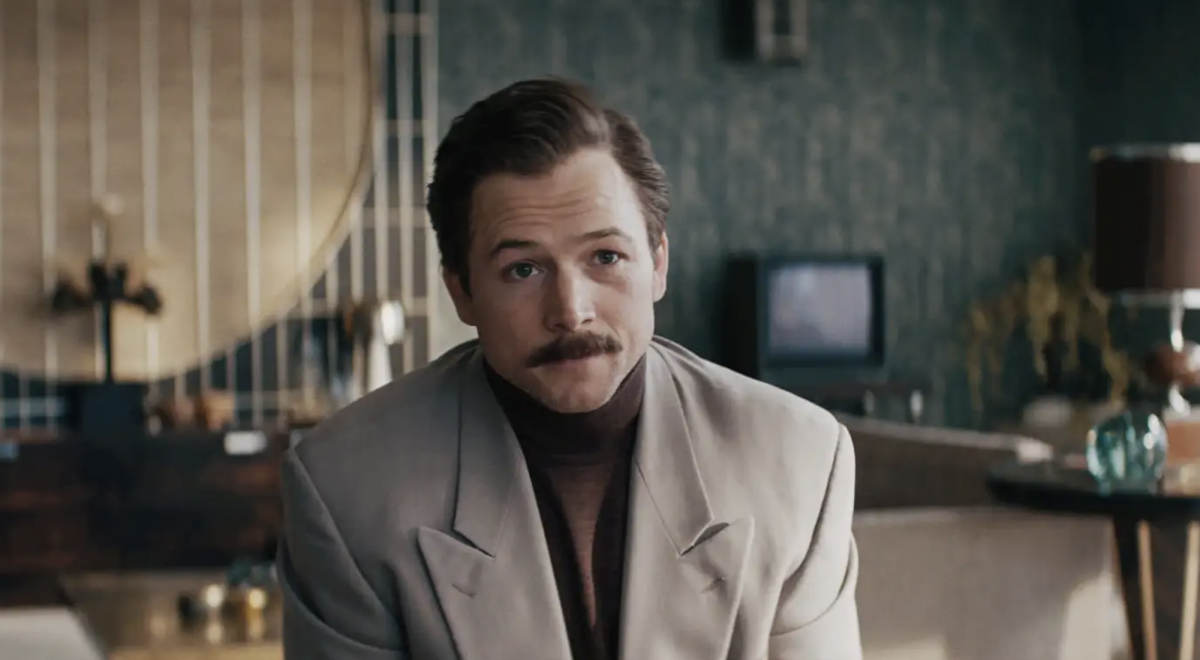
Taron Edgerton in Tetris – a pacy, fun (and slightly confusing) 80s romp. Photo: Supplied.
Remember the computer game Tetris from the late eighties? It was one of the first games on the Nintendo Gameboy along with Super Mario.
Players would move pieces that descended from the top of the screen and fit them into lines and once a line was complete at the bottom of the screen, it would disappear.
It was definitely an improvement from the video arcade computer games of my youth (Pong and Pac-Man), and it was also devilishly addictive.
I knew nothing about the game’s genesis until last week when I pulled up Apple TV on my computer to watch the film, simply titled Tetris.
And my word, what a story.
Set in 1988, American businessman Henk Rogers is at a Las Vegas computer game convention where he sees the game on display and becomes completely fascinated by it.
He soon discovers it was invented by a Soviet Programmer, Alex Pajintov, who works for ELORG, a state-owned organisation with a monopoly on the import and export of computer support and hardware.
However, the global rights have been obtained by entrepreneur Robert Stein, who signed a deal with Mirrorsoft software, a company owned by media tycoon Robert Maxwell and his son Kevin.
But Rogers finds a loophole. Stein doesn’t have the handheld rights for the soon-to-be-released Gameboy in Japan and seeks out Nintendo.
What happens from there is a fascinating riddle of who actually has the rights to the game. In fact, no one really does; it was effectively stolen from the Soviets, and the various deals Rogers, the Maxwells and Stein seek to secure have been meaningless until they get to Moscow and start talking to the Russians.
The Soviets are also in a game of playing each other off. They realise the USSR is about to come crashing down and are looking out for themselves.
Throw in an undercover KGB agent, a highly sceptical Mikhail Gorbachev, and after about half an hour, my head was spinning.
Even more remarkably, with the exception of one or two artistic flourishes, it’s all true.
What makes this movie work for me, apart from what on earth will happen next, is its sheer pace and storytelling.
Henk Rogers, played by Taron Egerton, who was utterly brilliant in the Elton John biopic Rocketman, is a complete force of nature.
He lives in Japan with his wife and daughters. His company is called Bullet-Proof Software because it would seem he can do practically anything.
He suffers quite a few setbacks in this affair, but the key to his eventual success is what happens when he first goes to the Soviet Union. His initial plan is to seek out Pajintov at ELORG (who, of course, hasn’t made one red cent from his game by this stage.)
They strike up an unlikely friendship, but Rogers is warned off repeatedly. He’s told it’s the Soviet Union and people can still disappear. But by this stage, he’s deep in a bidding war and, despite everything, presses on.
The film was written by Canadian Noah Pink and directed by Scotsman Jon S Baird, who gave us the most delightful Stan and Ollie in 2018.
Tetris is the unlikeliest of stories, but this is where streaming services like Apple, Netflix and others producing their own original content come to the fore. It’s clearly a lot cheaper than making movies for cinematic release and the streaming services can pick these quirky and odd stories and make them their own.
Tetris won’t set the house on fire, but it is a thoroughly funny and fascinating story that deserves telling. With its fast pace, a nostalgic glimpse back to the 80s and a terrific cast, I give it three and a half stars out of five.
Tetris is now streaming on Apple TV.
Marcus Kelson is a Canberra writer and critic.
Original Article published by Marcus Kelson on Riotact.



